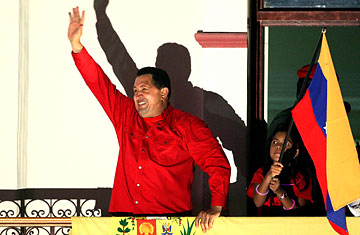
Venezuela's President Hugo Chávez celebrates his victory on Feb. 15, 2009, on a referendum on constitutional changes that will allow him to seek re-election without limits
When President Hugo Chávez first asked Venezuelans to eliminate presidential term limits in December 2007, they told him no. But on Sunday, as if resigned to the idea that he would keep on asking until he got the answer he wanted, voters said yes. Venezuela's second constitutional referendum in 14 months was approved by a resounding 54% to 45% margin, allowing Chávez to run for a third six-year term in 2012 and perhaps others after that.
Standing on the balcony of the Miraflores presidential palace to declare victory Sunday night in his trademark red shirt, the socialist firebrand shouted: "Today we opened wide the gates of the future!" Chávez may well have opened another kind of gate. For much of the latter half of the 20th century, it was the norm in Latin America to limit presidents to one term, a safeguard against the lifetime rule so many caudillos had set up for themselves in the past. As democracy gained a stronger foothold on the continent, many countries voted to allow their leaders a second stint in office. (See TIME's Pictures of the Week.)
The elimination of term limits in Venezuela could firmly establish a trend that, according to those who oppose such restrictions, will strengthen democracy by allowing voters to decide how long a popular leader can stick around. Term-limit proponents, however, say Chávez's triumph will only carry the region back to its authoritarian past. "What Venezuelan voters decide is their business," says John Walsh, a senior associate at the Washington Office on Latin America, an independent think tank. "But a threshold does seem to have been crossed."
In neighboring Colombia, supporters of conservative President Alvaro Uribe, whose second and constitutionally final term ends next year, are pushing for an amendment that would let him run again. Just as Chavistas insist Chávez is the only man who can carry through the sweeping populist reforms he began a decade ago, many Colombians feel only Uribe can safeguard the economic revival and improved security he's brought to South America's most war-torn country. Uribe so far has played it coy, neither declaring he wants another term nor denying it. Pundits say they'd be shocked if, after watching Chávez gain the opportunity, he doesn't fight for the same treatment. (See pictures of Colombia's guerilla army.)
Across the Andes in Ecuador, a constitutional referendum last year gave leftist President Rafael Correa the chance to govern until 2017. Correa first won in 2006; Ecuador's new constitution allows him to run for a four-year term in a special election this year, and then another in 2013. Bolivia's leftist President, Evo Morales, who was elected in 2005, won a similar reform in a referendum last month. The question now is whether both leaders will eventually follow their ally Chavez's lead and seek the right to run for re-election indefinitely. Elsewhere, political watchers are waiting to see if Argentina's President Cristina Fernandez, along with her predecessor and husband, Nestor Kirchner, will try to get term limits relaxed as well. Nicaraguan President Daniel Ortega is another.
Unless Venezuela's political landscape changes dramatically in four years, Chávez seems certain to win the next presidential election in 2012. His latest victory is a body blow to the country's struggling opposition, which scored some impressive wins in last year's regional elections but seemed to have lost the drive that helped it stun Chávez in the 2007 plebiscite. Opposition leaders caught Chávez napping in that election — he failed to get enough of his base to the polls — but this time it was their supporters who didn't show up. The Sunday vote had a 32% abstention rate, and election watchers assume most of the no-show was on the opposition side. Much of that can simply be attributed to voter fatigue: the referendum was the third national election for Venezuelans since December 2007.
